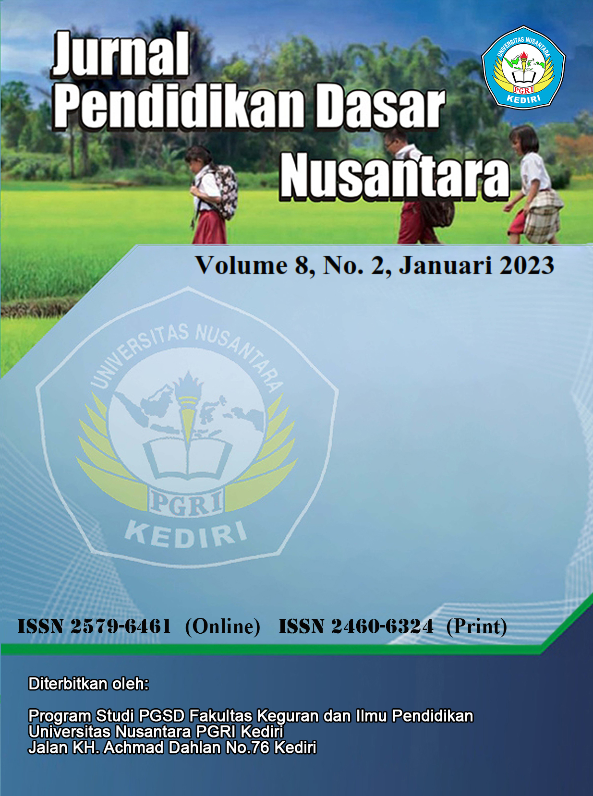Problems of moral development of elementary school age children in the kriyan ngadiluwih kediri localization area
DOI:
https://doi.org/10.29407/jpdn.v8i2.18644Keywords:
moral development, elementary school students, localizationAbstract
This study aims to find out in general the process of inculcating morals in elementary school age children in the Kriyan localization area, Ngadiluwih, Kediri. The type of research used is a qualitative study with a case study research design. The sample in this study was six resource persons consisting of three parents and three students. Research data were collected through interviews, observation, and document analysis. Based on the results of study, it is shown that parents instill moral values in their children from the age of 5-10 years with simple activities such as studying hard, not lying, not swearing, dressing neatly, speaking well, and learning to respect each other. By inculcating morals from elementary school age, it will make children easy to be accepted in society.
Downloads
References
Ambarwati, D. A., Eskasasnanda, I. D. P., & Purnomo, A. (2020). Dampak Ekonomi Penutupan Lokalisasi Bagi Masyarakat Semampir Kota Kediri. Jurnal Ilmu Sosial Dan Humaniora, 9(2), 162–174.
Anita, Y., Putera, R. F., & Ladiva, H. B. (2020). Kognitif Moral dalam Upaya Pembangunan Emotional Intelligence Siswa Sekolah Dasar. Jurnal Mutiara Pendidikan Indonesia, 5(2), 9–16.
Darmadi, H. (2012). Dasar Konsep Pendidikan Moral: Landasan Konsep Dasar dan Implementasi. Bandung: Alfabeta.
Deti, S., & Lestari, T. (2021). Upaya Meningkatkan Perkembangan Moral pada Anak Sekolah Dasar. Jurnal Pendidikan Tambusai, 5(1), 1696–1699.
Gunarsa, S. D. (2014). Dasar dan Teori Perkembangan Anak. Jakarta: Libri.
Isabela, N., & Hendriani, W. (2010). Resilience of Familes Who Living in the Neigborhood Dupak Bangunsari Localization. Jurnal Insan Media Psikologi, 12(3), 176–186.
Jalaluddin. (2012). Pendidikan Karakter Berbasis Keluarga. Jurnal Ta’dib, 17(1), 41–52.
Kohlberg, L. (1995). Tahap-Tahap Perkembangan Moral. Yogyakarta: Kanisius.
Lantolf, J. P., & Beckett, T. G. (2009). Sociocultural theory and second language acquisition. Language Teaaching, 42(4), 459–475. https://doi.org/10.1017/S0261444809990048
Lutfia, D. (2017). Pengaruh Outbound terhadap Kecerdasan Moral Anak Sekolah Dasar. Jurnal RAP (Riset Aktual Psikologi Universitas Negeri Padang), 5(2), 125–135.
Maharani, L. (2014). Perkembangan Moral Pada Anak. Konseli: Jurnal Bimbingan Dan Konseling, 1(2), 104–109.
Moleong, L. J. (2014). Metode Penelitian Kualitatif. Bandung: Remaja Rosdakarya.
Okin, S. M., & Reinch, R. (1999). Families and Schools as Compensating Agents in Moral Development for Multicultural Society. Journal of Moral Education, 28(3), 283–298.
Poespoprodjo. (1998). Filsafat Moral. Bandung: Remaja Karya.
Prasetiya, B., Agusti, M., & Halili, H. R. (2021). StudentMorality Behavior: A Contribution of Social Godliness and Religiosity. Jurnal Pendidikan Agama Islam, 18(2), 375–388.
Ruslan, Elly, R., & Aini, N. (2016). Penanaman Nilai-Nilai Moral pada Siswa di SD Negeri Lampeuneurut. Jurnal Ilmiah Mahasiswa Prodi PGSD FKIP Unsyiah, 1(1), 68–77.
Ruyter, D. J. de, & Miedema, S. (2011). Moral Education and Development. Sense Publishers.
Sesmiarni, Z. (2019). The Effective Moral Education on Early Childhood As an Effort Against Immoral Culture. Jurnal Obsesi, 3(2), 561–569.
Slavin, R. E. (2011). Psikologi Pendidikan Teori dan Praktik. Edisi kesembilan Jilid 2 diterjemahkan oleh Marianto Samosir. Jakarta: Indeks.
Syafe’i, M., & Rukiyati. (2017). Pengembangan Moral Anak Di Lingkungan Lokalisasi Pasar Kembang TK PKK Sosrowijayan Yogyakarta. Jurnal Pendidikan Karakter, 7(1), 100–108.
Wahyuningsih, R., Hanurawan, F., & Ramli. (2020). Peran Keluarga pada Perkembangan Moral Siswa SD di Lingkungan Eks Lokalisasi. Jurnal Pendidikan: Teori, Penelitian, Dan Pengembangan, 5(5), 587—593.
Winarno, J. (2015). Pelacuran dan Penanggulangannya dalam Perspektif Politik Hukum Pidana. Jurnal Independent, 3(2), 59–78.
Yulia, H. (2018). Morality: The Need of Today’s Education. Jurnal Elsa, 16(1), 47–57.
Downloads
Published
Issue
Section
License
Authors who publish with this journal agree to the following terms:
- Copyright on any article is retained by the author(s).
- The author grants the journal, the right of first publication with the work simultaneously licensed under a Creative Commons Attribution License that allows others to share the work with an acknowledgment of the work’s authorship and initial publication in this journal.
- Authors are able to enter into separate, additional contractual arrangements for the non-exclusive distribution of the journal’s published version of the work (e.g., post it to an institutional repository or publish it in a book), with an acknowledgment of its initial publication in this journal.
- Authors are permitted and encouraged to post their work online (e.g., in institutional repositories or on their website) prior to and during the submission process, as it can lead to productive exchanges, as well as earlier and greater citation of published work.
- The article and any associated published material is distributed under the Creative Commons Attribution-ShareAlike 4.0 International License
































